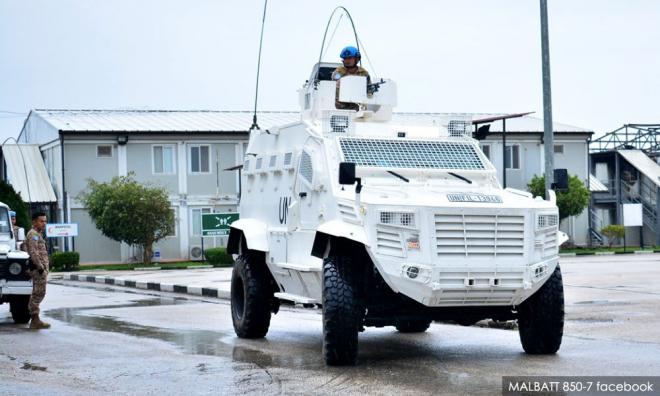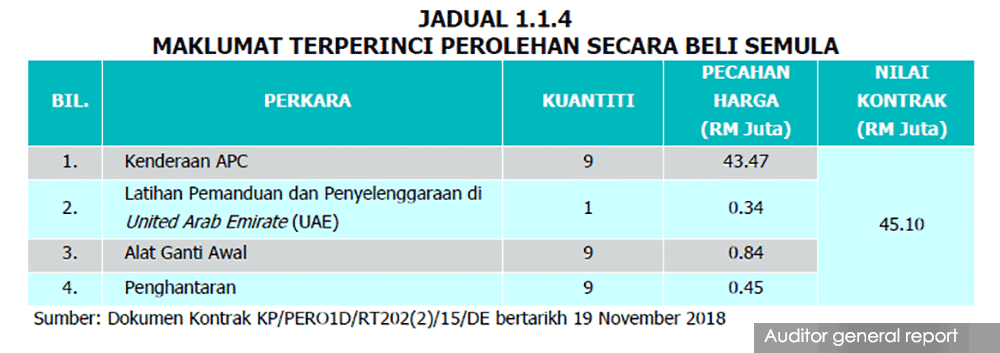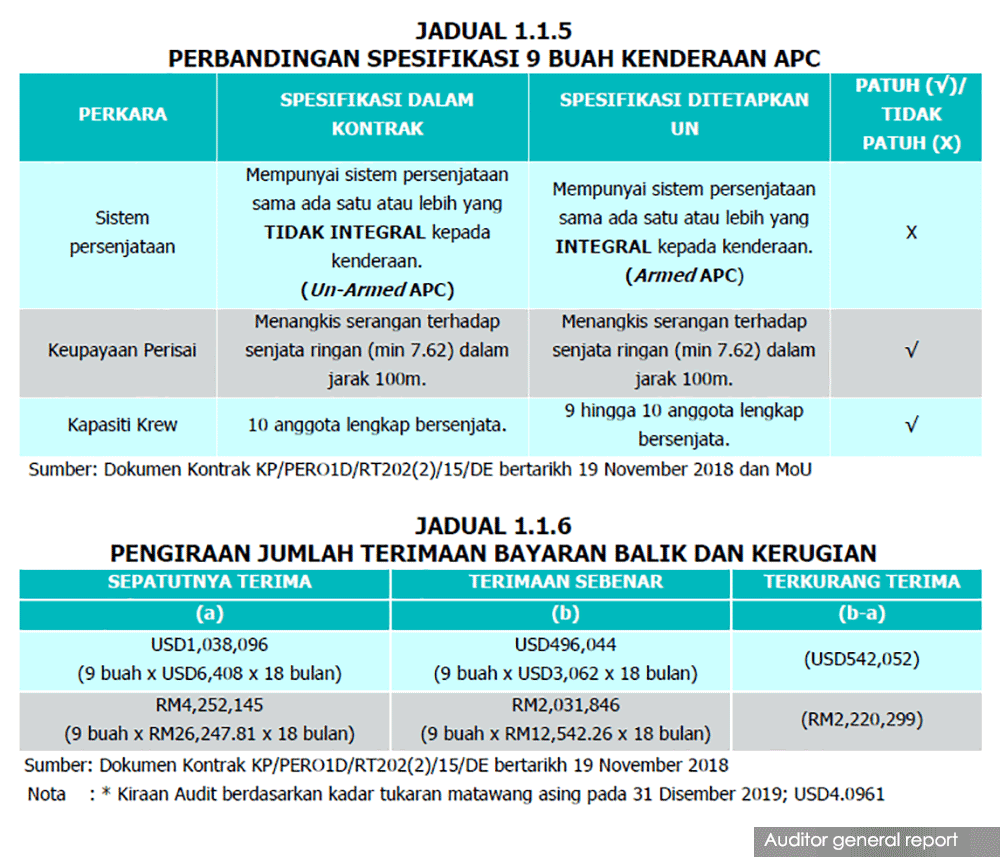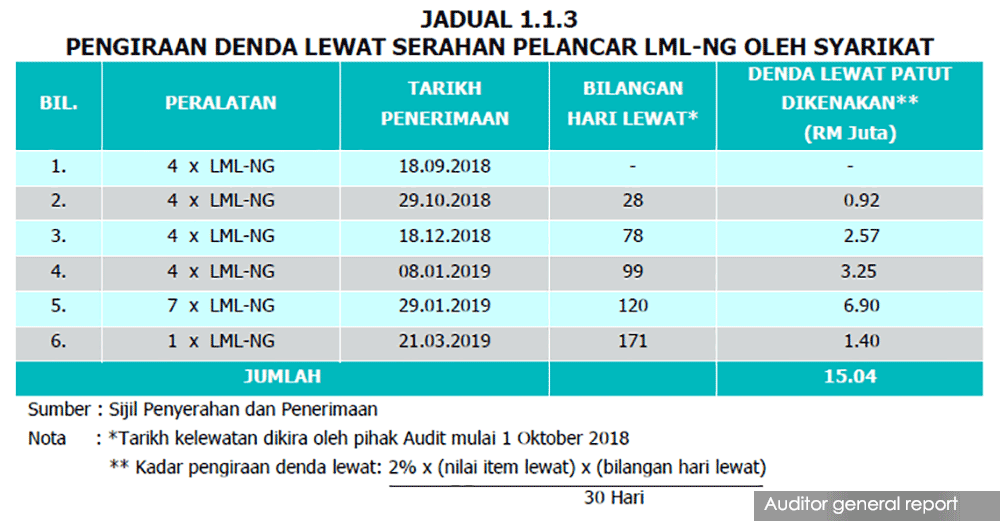Sub-standard armoured personnel carriers put our soldiers in danger

The delivery of sub-standard armoured personnel carriers (APCs, above) could put the Malaysian troops operating under the United Nations Interim Force in Lebanon (Unifil) exposed to gunfire if they come under attack.
The Auditor-General's Report 2019 Series 1, released yesterday, says the UN specifications require that the vehicles be equipped with an integrated weapons system.
However, the nine vehicles received were instead equipped with a machine gun that had to be operated manually by the vehicle commander.
“Soldiers ought to be able to shoot from within the APC, but since the APC was not according to specifications, the soldiers are forced to pop their heads out of the vehicle to open fire.
“The vehicles have been brought to Lebanon for operations. We can only pray for their safety,” Berita Harian quoted auditor-general Nik Azman Nik Abdul Majid as saying at a press conference yesterday when releasing the Series 1 report.
The report said the nine APCs are part of an RM897 million procurement deal that was awarded through direct negotiation, lasting from August 2015 to June 2019.
As part of the deal, a company would supply Malaysia’s armed forces with Starstreak missiles, and buy up Malaysia’s stock of retired Starburst missiles for RM60 million.
The Starburst is a very short-range air defence system that was stopped for the Malaysian armed forces, in 2009, to be replaced with the newer Starstreak missiles.
Of the RM60 million to pay for the old missiles, RM45.10 million was to be paid through the delivery of the nine APCs between February 2017 and June 2019, while the remaining RM14.90 million involved 107 Westar Maxus V80 vans.
The APC is a type of armoured fighting vehicle designed to ferry a small group of soldiers on the battlefield while providing them with protection against small-arms fire and shrapnel.
The contract required the nine APCs to be handed over to Malaysia Battalion 850-5 (Malbatt 850-5), which was serving in Lebanon at the time under the auspices of the UN.
However, the audit report said that while a memorandum of understanding with the UN called for Malaysia to provide APCs that have at least one integral weapons system for the peacekeeping mission, the specifications in the contract with the company instead specified “one or more weapons systems that are not integral to the vehicle”.
This meant that when the UN paid Malaysia reimbursements for the latter’s role in the mission, there was a shortfall of RM2.22 million.
“The audit found there is a shortfall of reimbursement received up to Dec 31, 2019, amounting to RM2.22 million for nine APCs for a period of 18 months.
“The shortfall is a loss to the government, caused by failure to abide with specifications set (by the UN),” the report said.
In response to the audit findings, the Defence Ministry countered that the APCs had passed the final acceptance test in 2018, and were accepted for use in the Unifil mission.
The vehicles had also passed the “Contingent Own Equipment” inspections on July 20, 2018.
“The non-compliance to APC specifications set by the UN was only in terms of weaponry, since it was not equipped with a turret or a remote-controlled weapon station.
“Instead, the APC was only equipped with a 7.62mm general purpose machine gun on the commander’s cupola,” the ministry said in its reply dated July 22, which has been incorporated in the audit report.
Despite the explanation given, the audit report said, “Although the APCs have passed COE inspection for use in the Unifil mission, failure to fully comply with conditions for the reimbursement caused a loss of income amounting to RM2.22 million.”
The report recommended that the ministry ensures that buyback contracts are prepared based on the needs of the relevant parties.
The audit also found problems with other aspects of the missile deal as well.
It said the company was supposed to provide 24 Lightweight Multiple Launcher – New Generation (LML-NG) for the missiles by September 2018.
However, the Defence Ministry failed to impose late penalties when the company delivered 20 of the launchers between 28 to 171 days behind schedule.
“The late handover is caused by one component of the LML-NG launcher that required approval under the US International Traffic in Arms Regulations.
“Based on audit calculations, the late penalty that should have been imposed is RM15.04 million,” the audit report said.
In response to the audit findings, the Defence Ministry said it had given preliminary notice of an RM5.93 million penalty on Dec 18, 2019.
It said the company has appealed and provided justifications for the delay, and the appeal is undergoing legal review for an RM15.04 million penalty.
“The imposition of the latest late penalties will be conducted in accordance to procedure, after receiving feedback from the Legal Department.
“The Procurement Department is in process of obtaining additional documents required by the Legal Department,” the ministry said. -Mkini
✍ Credit given to the original owner of this post : ☕ Malaysians Must Know the TRUTH
🌐 Hit This Link To Find Out More On Their Articles...🏄🏻♀️ Enjoy Surfing!






















Post a Comment